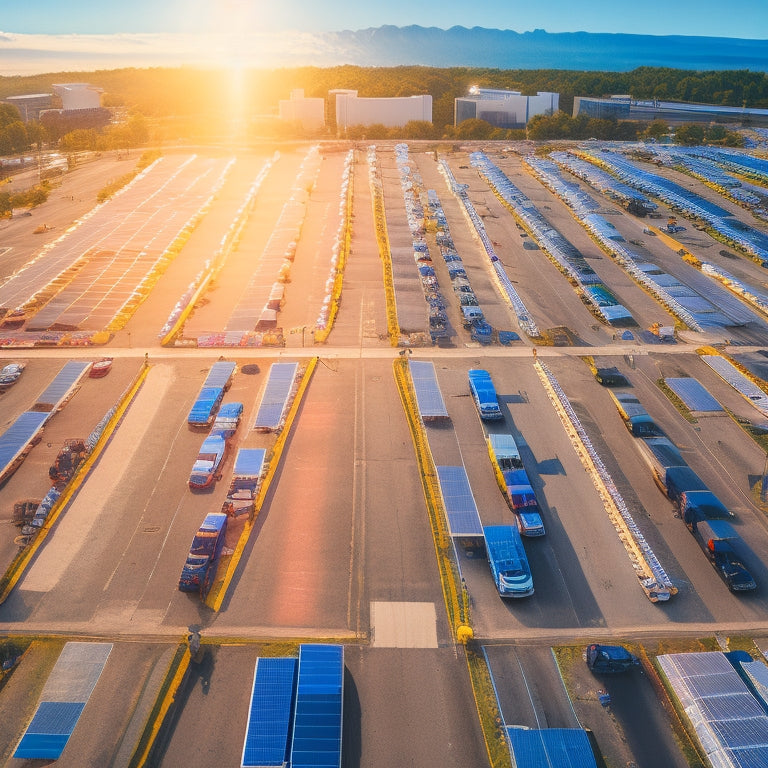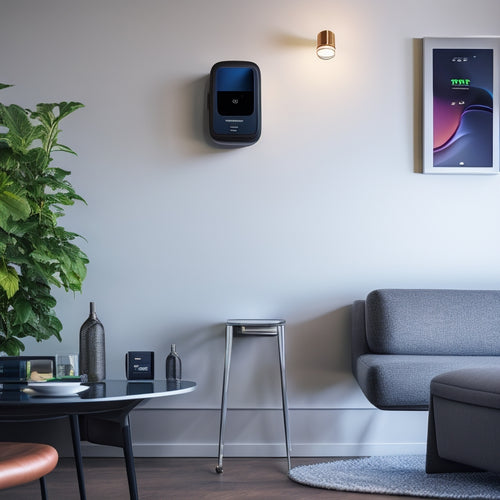
What Solar Panels Are Best for Commercial Fleets?
Share
When selecting solar panels for your commercial fleet, prioritize high-efficiency ratings, durable designs, and seamless integration with your existing systems. Look for panels with efficiency ratings above 20%, durable frames, and reliable warranties. Brands like SunPower, Panasonic, and Trina Solar offer high-performing modules. Confirm compatibility with your commercial vehicles, considering factors like roof space and energy requirements. By choosing the right solar panels, you can maximize energy output, reduce costs, and improve your return on investment. As you explore your options, you'll discover more ways to optimize your fleet's energy efficiency.
Key Takeaways
• Consider high-efficiency solar panels above 20% for maximum energy output and faster ROI.
• Choose durable panels with reliable warranties, rust-resistant frames, and weatherproofing features.
• Ensure compatibility with commercial vehicles, evaluating fleet size, energy requirements, and available roof space.
• Select panels from top brands like SunPower, Panasonic, and Trina Solar, known for their high-performing modules.
• Evaluate the cost-benefit analysis, including upfront installation, maintenance, and potential replacement costs, against reduced fuel consumption and revenue from excess energy sold.
Understanding Commercial Solar Panel Needs
When evaluating solar panels for your commercial fleet, it's important to assess your energy requirements and identify areas where solar power can effectively reduce your energy expenditures. This involves understanding your current energy usage patterns, including peak demand periods and overall energy consumption.
A thorough analysis will help you determine the best solar panel system size and configuration for your fleet's specific needs.
Solar education is key in making informed decisions about energy conservation. It's vital to recognize the benefits of solar power, including reduced energy costs and a lower carbon footprint.
By investing in solar panels, you can greatly decrease your reliance on traditional energy sources, resulting in substantial cost savings over time. Additionally, solar power can provide a stable and predictable energy source, allowing you to better plan and manage your energy expenses.
Top Solar Panel Brands for Fleets
When selecting a solar panel brand for your commercial fleet, you're likely looking for products that excel in three key areas.
You need panels with high efficiency ratings to maximize energy production, durable solutions that can withstand the demands of frequent use, and high-performing modules that provide consistent results.
Panel Efficiency Ratings
Your fleet's solar panel efficiency hinges on the quality of the panels, with top brands boasting ratings that can significantly impact your energy output and bottom line. When selecting a solar panel brand, it's crucial to take into account the panel efficiency ratings, which measure the percentage of sunlight converted into electricity. Higher efficiency ratings typically translate to more energy production per unit area, making them ideal for commercial fleets.
Look for brands with high-efficiency ratings, typically above 20%, to maximize your energy output. Additionally, consider the temperature coefficient, which affects the panel's performance in high temperatures. A lower temperature coefficient ensures your panels maintain their efficiency even in hot conditions.
By choosing a brand with high efficiency ratings, you can increase your energy production, reduce your carbon footprint, and take advantage of solar incentives. When evaluating brands, contemplate energy metrics such as kilowatt-hours (kWh) per unit area to ensure you're getting the most out of your solar panel investment.
Durable Fleet Solutions
For commercial fleets seeking reliable and efficient solar panel solutions, top brands like SunPower, Panasonic, and Trina offer durable and high-performance options that can withstand harsh environmental conditions and minimize maintenance needs.
When customizing your fleet with solar panels, you want solutions that prioritize fleet safety and adapt to your unique needs. Here are some key benefits to take into account:
-
Rugged designs: These top brands design their solar panels with durability in mind, ensuring they can withstand extreme temperatures, heavy rain, and other environmental stressors.
-
Low maintenance: With high-quality solar panels, you'll spend less time and resources on repairs and replacements, keeping your fleet on the road and running smoothly.
-
Customizable options: Top brands offer a range of solar panel sizes, shapes, and mounting options to fit your unique vehicle customization needs, ensuring a seamless integration with your fleet.
High-Performing Modules
High-performing solar panel modules from reputable brands like SunPower, Panasonic, and Trina Solar empower commercial fleets to harness renewable energy efficiently. These top-tier brands offer high-efficiency modules that maximize energy harvesting, ensuring you get the most out of your solar investment.
When selecting modules for your fleet, module reliability is essential. You need modules that can withstand harsh environmental conditions and operate at peak levels for an extended period. SunPower's X-Series modules, for instance, boast an impressive 22.8% efficiency rate, making them an excellent choice for commercial fleets. Panasonic's HIT-240 modules, on the other hand, offer high energy output and exceptional durability. Trina Solar's TALLMAX M10 modules feature a robust design, ensuring consistent energy harvesting even in low-light conditions.
When it comes to energy harvesting, you want modules that can capture every available photon. High-performing modules from these brands are designed to do just that, providing maximum energy output while minimizing losses.
Key Features for Commercial Solar Panels
When selecting commercial solar panels for your fleet, you'll want to prioritize key features that guarantee peak performance and longevity.
You'll need high-efficiency panels that maximize energy output, durable construction that withstands harsh weather conditions, and reliable warranties that minimize downtime.
High Efficiency Ratings
Your commercial solar panel installation's overall performance hinges on the high efficiency ratings of its individual components, making this key feature a crucial consideration in your selection process. High-efficiency solar panels can greatly reduce your energy costs and carbon footprint, allowing you to maximize your energy savings.
When evaluating solar panels for your commercial fleet, look for high-efficiency ratings that ensure optimal energy production. Here are some key benefits to take into account:
-
Increased Energy Production: High-efficiency solar panels can generate more electricity per unit area, reducing the space required for your solar panel installation.
-
Reduced Carbon Footprint: By producing more electricity from the same surface area, you can lessen your reliance on fossil fuels and lower your carbon footprint.
-
Improved ROI: High-efficiency solar panels can lead to faster returns on your investment, as you'll be generating more electricity and reducing your energy costs.
Durability and Warranty
Commercial solar panels must withstand harsh environmental conditions and last for decades, making durability and warranty critical considerations in your selection process. You need to guarantee that the panels can resist rust and corrosion, especially in coastal or high-humidity areas. Look for panels with rust-resistant frames and weatherproofing features, such as sealed junction boxes and IP65-rated connectors. This will assure that your system remains operational even in extreme weather conditions.
A thorough warranty is also essential to protect your investment. You should opt for panels with a minimum 25-year warranty on performance and 10-year warranty on materials and workmanship. This will provide you with peace of mind and protection against unexpected repairs or replacements. Additionally, consider manufacturers that offer extended warranty options or dedicated customer support.
Compatibility and Integration
When you guarantee the durability and warranty of your commercial solar panels, you'll also want to contemplate their compatibility and integration with your existing infrastructure. Seamless system integration is vital for peak energy harvesting and monitoring. This guarantees that your solar panels can effectively communicate with your existing systems, such as building management systems, energy management systems, and other monitoring tools.
To ensure a smooth integration, consider the following key aspects:
-
System Design: Make sure that your solar panels can be easily integrated into your existing system design, without requiring significant modifications or additional infrastructure.
-
Data Interoperability: Verify that your solar panels can seamlessly exchange data with your existing systems, enabling real-time monitoring and efficient energy management.
-
Third-Party Integration: Consider solar panels that can integrate with third-party systems, such as energy storage systems or demand response systems, to optimize your energy usage and reduce costs.
Solar Panel Efficiency and Durability
Optimizing solar panel efficiency and durability is essential to maximize the return on investment for your commercial fleet, as even minor enhancements can greatly impact your bottom line.
When selecting solar panels for your fleet, you should prioritize those that offer high efficiency rates, typically above 20%. This guarantees you're generating the most power possible from the available roof space. Additionally, look for panels with a proven track record of reliability, backed by warranties and certifications that secure their performance over time.
Climate resilience is another important aspect to take into account. Commercial fleets often operate in diverse environments, from scorching deserts to humid coastal regions. You need solar panels that can withstand extreme temperatures, humidity, and weather conditions. Panels with high temperature coefficients and robust weather sealing will ensure consistent performance, even in harsh climates.
Compatibility With Commercial Vehicles
You'll need to make sure that your solar panels are compatible with your commercial vehicles, as mismatches can lead to reduced energy output and increased installation costs. The weight and size of your vehicles play a significant role in determining the right solar panels for your fleet.
Here are some key factors to keep in mind:
-
Vehicle Weight: Confirm that the solar panels can withstand the weight of your vehicles, especially if you have heavier trucks or buses.
-
Fleet Size: Take into account the number of vehicles in your fleet and the total energy requirements. This will help you determine the number of solar panels needed.
-
Roof Space: Evaluate the available roof space on your vehicles to determine the most suitable solar panel size and configuration.
Cost-Benefit Analysis for Fleets
Conducting a thorough cost-benefit analysis of solar panels for your commercial fleet is essential to understanding the financial implications of this investment and maximizing your return on investment. When evaluating the costs, consider the upfront installation expenses, maintenance costs, and potential repair or replacement costs. On the other hand, the benefits include reduced fuel consumption, lower emissions, and potential revenue from excess energy sold back to the grid.
Here's a breakdown of the key financial considerations:
| Costs | Benefits |
|---|---|
| Upfront installation expenses | Reduced fuel consumption |
| Maintenance and repair costs | Lower emissions |
| Potential replacement costs | Revenue from excess energy sold |
Additionally, don't forget to factor in regulatory incentives, such as tax credits or grants, which can greatly reduce the upfront costs. By projecting your financial returns and incorporating these incentives, you can create a detailed cost-benefit analysis that informs your decision-making process. This analysis will help you determine whether solar panels are a viable investment for your commercial fleet and provide a clear understanding of the financial implications.
Installation and Maintenance Considerations
When integrating solar panels into your commercial fleet, meticulous planning and execution of the installation process is vital to ensuring a seamless and efficient setup that minimizes downtime and maximizes energy output.
To guarantee a successful installation, you'll need to take into account several key factors. Here are a few critical considerations:
-
Roof access: Confirm that your installation team has safe and convenient access to the roof for installation, maintenance, and repair. This may involve installing roof access ladders, walkways, or other safety features.
-
Ground mounting: If you're opting for a ground-mounted system, contemplate the site preparation and foundation requirements to ensure a stable and secure installation.
-
Electrical infrastructure: Validate that your electrical infrastructure can support the added power output from the solar panels, and make any necessary upgrades to your electrical system.
Frequently Asked Questions
Can Solar Panels Be Installed on Leased or Rented Properties?
You'll need to negotiate landlord agreements that address property rights, ensuring you have permission to install solar panels on leased or rented properties, and clarifying who owns the system and is responsible for maintenance.
How Do Weather Conditions Affect Solar Panel Performance?
You'll notice that weather conditions have a notable impact on solar panel performance; for instance, cloudy days reduce output, while high temperatures affect efficiency due to temperature coefficients, which vary by panel type and manufacturer.
Are There Any Government Incentives for Commercial Solar Adoption?
You can benefit from government incentives for commercial solar adoption, including Tax Credits and Renewable Grants, which can greatly offset installation costs, making solar energy a more viable option for your business.
How Often Should Solar Panels Be Cleaned for Optimal Performance?
You should clean your solar panels every 6-12 months to prevent dust accumulation, which can reduce energy output by up to 25%. Regular panel maintenance guarantees peak performance and safety.
Can Solar Panels Be Integrated With Existing Fleet Management Systems?
As you navigate the solar panel landscape, you'll find that integrating them with existing fleet management systems is a breeze, thanks to API integration, allowing seamless data analytics and a bird's-eye view of your sustainable fleet's performance.
Related Posts
-

7 Best EV Battery Health Trackers for Homeowners
You can maximize your electric vehicle's performance and lifespan by leveraging advanced battery health trackers that...
-

7 Best Automated Sprinklers for Water-Wise Green Homes
You're likely among the 75% of U.S. homeowners who use in-ground sprinkler systems, and coincidentally, you're also c...
-

10 Best Sustainable Waste Management Solutions for Green Homes
You're likely unaware that the average green home generates over 2 kilograms of waste daily, but with the right susta...


